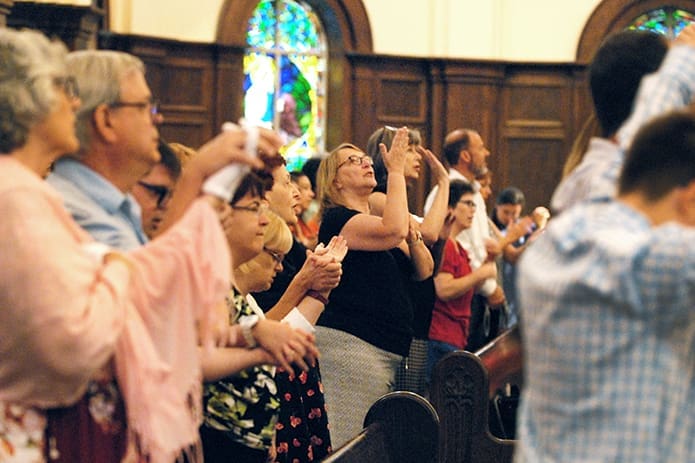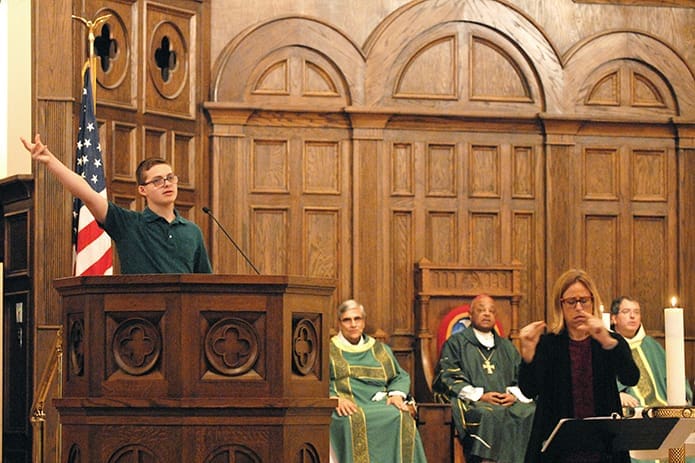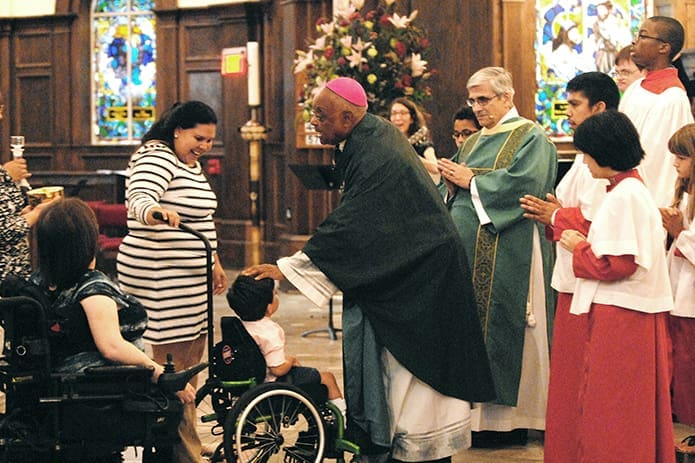Judie Zervic, center, an interpreter with the deaf ministry at Transfiguration Church, Marietta, signs the Our Father at the Faith and Sharing Mass of Inclusion at Holy Spirit Church, Atlanta, Sept. 2. The Mass marked the 40th anniversary of the “Pastoral Statement on Persons with Disabilities” released by the U.S. Conference of Catholic Bishops in November 1978. Photo by Laura Moon
Atlanta
Disabilities ministry’s Faith and Sharing Mass welcomes all to table
By ERIKA ANDERSON REDDING, Special to the Bulletin | Published September 20, 2018
ATLANTA—In 1978, the U.S. Conference of Catholic Bishops released a landmark statement calling for the Church to advocate and include those with disabilities. Forty years later, members of the disabilities community in the Archdiocese of Atlanta gathered to celebrate the statement and pray for the growth they believe is yet to come
Archbishop Wilton D. Gregory celebrated the biannual Faith and Sharing Mass, hosted by the archdiocesan Disabilities Ministry, on Sunday, Sept. 2, at Holy Spirit Church. The celebration marked the 40th anniversary of the “Pastoral Statement on Persons with Disabilities” released by the USCCB in November 1978. The statement proclaims the right of every person with a disability to be welcomed into the fullness of the Church—through participation, inclusion, accessible facilities and social activities.
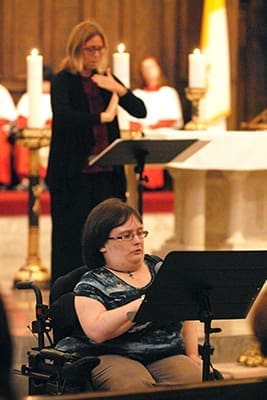
Lauren Grzeszkowiak reads the second reading during the Faith and Sharing Mass at Holy Spirit Church Sept. 2. Grzeszkowiak, a parishioner at St. Ann Church, Marietta, has spina bifida. She was one of 17 individuals serving at the Mass. Photo by Laura Moon
“People with disabilities are not looking for pity. They seek to serve the community and to enjoy their full baptismal rights as members of the Church,” the letter reads. “Our interaction with them can and should be an affirmation of our faith. There can be no separate Church for people with disabilities. We are one flock that serves a single shepherd.”
The Faith and Sharing Mass proved a tangible example of the bishops’ statement.
“We had 17 individuals directly participating in the mass from 17 different parishes,” said Maggie Rousseau, director of the Disabilities Ministry.
The foundation to welcome
Members of the disabilities community brought forward the gifts and served as lectors. The Prayers of the Faithful were created by John McCarty, a nonverbal parishioner from St. Peter Chanel Church, Roswell, who used a communication device to write the prayers. Robert Galbuzi, a member of St. Monica Church, Duluth, who has autism, sang “Amazing Grace” after communion. American Sign Language (ASL), interpreters were on hand for the entirety of Mass for members of the deaf community. Benedictine Father Linus Klucsarits, fluent in ASL, concelebrated the Mass.
“We all have grace that we can share,” Rousseau said. “The USCCB Statement on Persons with Disabilities provides us the foundation to welcome. It is up to each of us to open the door, and happily exclaim, ‘you are here! How wonderful!’’’
In his homily, Archbishop Gregory said it’s important to invite people to a celebration. He spoke of Labor Day, which was celebrated the day after the Mass. Though many people had done a lot of preparation for cookouts, such as readying their homes and the meal, it wasn’t the most important thing to do.
“You’ve done all the preparation for a wonderful celebration. But what if you forgot to invite the guests? Your preparation would have meant nothing without bringing together the people that you want to celebrate with,” he said. “In today’s Gospel, Jesus reminds his disciples to remember to do the most important things rather than the less important things. All of the preparation for a big feast will mean nothing unless you invite the people who need to be at the feast.”
All must be welcomed to the table in order for it to be a true celebration, Archbishop Gregory said.
“We gather today with so many of our special friends who have come together here at Holy Spirit. And you remind us that our table, the Eucharist, the altar, will never be complete if we don’t invite you to come there,” he said. “So this is a wonderful reminder for the whole church that the Lord’s table will never be fully complete without all the people who are invited to the banquet. So welcome in a special way to those who have come from other parishes and other communities, because when you are here, the table is complete and the Lord’s banquet is as it should be.”
Following the Mass, attendees gathered in McDonough Hall for food and fellowship.
Melinda Payne, an ASL interpreter at Transfiguration Church in Marietta, learned the language in the late 1970s when she lived in a small town and was inspired by an older couple who were hearing impaired. She’s been an interpreter at Transfiguration for the past eight years, and though she’s seen a lot more inclusion for those who are deaf, she hopes to see even more growth.
“Masses like this are awesome, but we still have a long way to go for the deaf community to feel truly welcomed,” she said. “Many feel disenfranchised and don’t have the support they need.”
Support is available
Fellow Transfiguration ASL interpreter Judie Zervic said those who are hearing impaired should know they have support if they ask.
“I want people to know that they have the right to ask the archdiocese. They will help work something out—either get them an interpreter or find a parish who has interpreters,” she said.
Joy Fuchs is the provincial coordinator for Faith and Light USA East. A Catholic prayer group for those with developmental disabilities, Faith and Light has communities throughout the world. Fuchs’ daughter, Gretchen, who has developmental disabilities, has inspired her involvement in the organization.
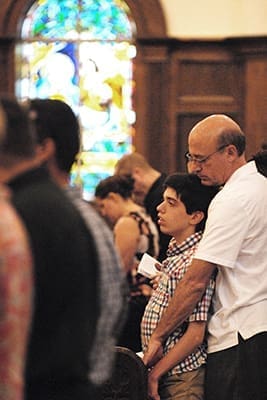
At the Mass of inclusion hosted by the archdiocesan disabilities community, Paul Valcheff holds his son, Christian, who has cerebral palsy. The Valcheffs attend St. Brendan Church, Cumming. Photo by Laura Moon
“I think we’re getting better, but we do need more inclusion from the church,” she said. “My hope is that the pastors, deacons and staff have an openness to those with disabilities. We have to ask for support—it doesn’t come from them. My hope is that that will change. People with disabilities need access to the sacraments, to the Gospel, to respite and relationships. And parents with kids—those who have disabilities and those who don’t—need a place to come together to share their resources and their joys and concerns.”
Janet Grzeszkowiak, whose daughter, Lauren, offered the second reading at Mass, is the Faith and Light coordinator for greater Atlanta. A parishioner of St. Ann Church in Marietta, she said there has been an evolution of people with disabilities.
“When I grew up, people with disabilities were hidden away. We are now more apt to take our children to church,” she said. “I think it’s more welcoming to have people with disabilities attend Mass—much more than it was 40 years ago. They have right to be seen and heard, a right to participate. People with disabilities want what we all want—to be loved and accepted as part of a community.”
Rousseau, whose late son, Christopher, was born with a rare and severe genetic disorder, said she continues to admire the community.
“I am so inspired by the faithfulness of the families who live with disabilities. We know our faith, live our faith, share our faith and can be the spark that builds our church,” she said. “Forty years ago, the USCCB believed this. The ‘Statement on Persons with Disabilities’ was the conduit to enable all to be welcomed at the table, to enable those with differences to participate in the sacramental life of the Church.
For more information on the Disabilities Ministry, visit archatl.com/ministries-services/disabilities-ministry.
